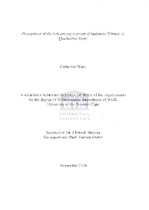| dc.contributor.advisor | Stander, Christell | |
| dc.contributor.advisor | Shefer, Tamara | |
| dc.contributor.author | Wani, Catherine | |
| dc.contributor.other | Women and Gender Studies | |
| dc.contributor.other | Faculty of Arts | |
| dc.date.accessioned | 2013-06-21T06:28:35Z | |
| dc.date.available | 2007/03/27 13:48 | |
| dc.date.available | 2007/03/27 | |
| dc.date.available | 2013-06-21T06:28:35Z | |
| dc.date.issued | 2004 | |
| dc.identifier.uri | http://hdl.handle.net/11394/1545 | |
| dc.description | Magister Philosophiae - MPhil | en_US |
| dc.description.abstract | The Islamic dress code has been forcibly imposed on the women in Sudan, since 1983, and many feminists researchers have criticized the practices of the veil as a tool to oppress women. This study aimed to explore a group of Sudanese women, currently living in South Africa, experiences and perceptions of the veil, whether the veil is a religious dress code or a tool that has been used to exercise inequality. | en_US |
| dc.language.iso | en | en_US |
| dc.publisher | University of the Western Cape | en_US |
| dc.subject | Islamic clothing and dress | en_US |
| dc.subject | Muslim women | en_US |
| dc.subject | Clothing | en_US |
| dc.subject | Veils | en_US |
| dc.subject | Religious aspects | en_US |
| dc.subject | Islam | en_US |
| dc.title | Perceptions of the veil among a group of Sudanese women: a qualitative study | en_US |
| dc.type | Thesis | en_US |
| dc.rights.holder | University of the Western Cape | en_US |
| dc.description.country | South Africa | |

